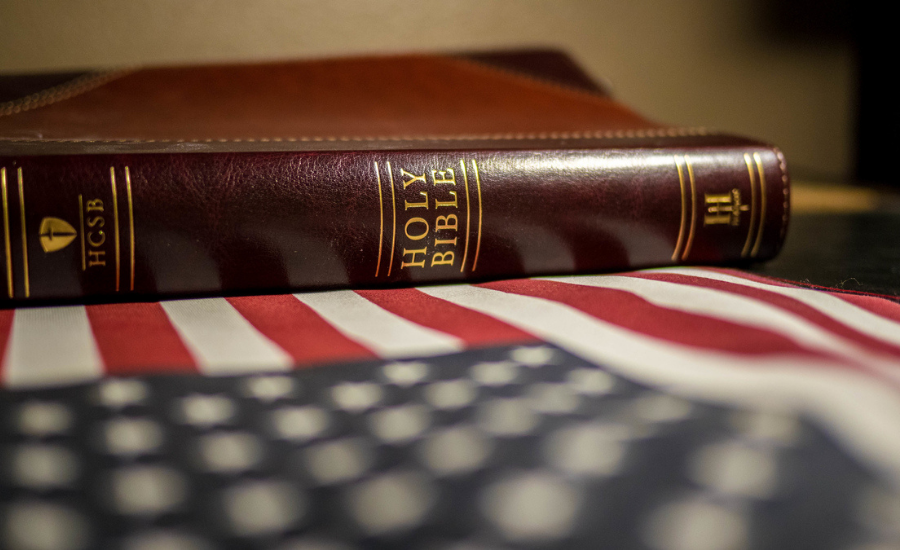Trump's Bible Sales: A Divine Dispute or Unwarranted Uproar?
By EEW Magazine Online // Faith and Culture Wars // Opinion
Donald Trump is catching flak for selling “God Bless The USA” Bibles. (Credit: EEW Magazine Online)
As the waves of discourse crash upon the shores of public opinion, the latest ripple comes from former President Donald Trump's venture into selling Christian Bibles. The reactions have been as diverse as the electorate, with many Christians, particularly within the democratic base, expressing their anger and disapproval.
But as we navigate through the seas of skepticism and criticism, it's worth anchoring ourselves to a biblical perspective to find balance amid the tempest.
In Philippians 1:15-18, Apostle Paul reflects on the motivations of those who preach Christ. Some do so out of goodwill and love, while others are driven by selfish ambition. Though Paul is aware of the latter's dubious intentions, he rejoices nonetheless, for Christ is proclaimed. This passage provides a nuanced lens through which we can examine Trump's actions, acknowledging the complexity of the issue without resorting to the pitchforks of partisanship.
Trump's promotion of a "God Bless The USA" Bible” during Holy Week has been met with both skepticism and scorn. The Bible, which retails at $59.99 and is adorned with patriotic symbols, has been criticized for commercializing faith and exploiting religious sentiments. On the promotional website the description says, “This Bible invites you to explore God’s Word anywhere, any time.”
Sen. Raphael Warnock, D-Ga., a pastor himself, has condemned this venture, likening it to the money changers in the temple whom Jesus drove out.
Democratic politician and pastor Raphael Warnock is not a big fan of Trump’s latest Bible-selling venture. (Credit: Matthew Pearson/WAB/EEW Magazine Online)
“The Bible does not need Donald Trump’s endorsement, and Jesus, in the very last week of his life, chased the money changers out of the temple, those who would take sacred things and use them as cheap relics to be sold in the marketplace,” said the senior pastor at Ebenezer Baptist Church in Atlanta in an Easter Sunday sit-down with CNN’s “State of the Union” with Dana Bash. “The sad thing is that none of us are surprised by this — this is what we expect from the former president.”
Yet, the question arises: are there not worse things Trump could be selling? Amidst the myriad of controversial products and ventures that have been associated with Trump, the act of selling Bibles seems incongruous with the outrage it has sparked. While we do not dismiss the valid concerns about the commercialization of faith, it is important to note that the act of making scripture available, even by someone as polarizing as Trump, does not obstruct the gospel's reach. Should we, then, pounce upon him for peddling Bibles?
The essence of the scripture being spread, irrespective of the messenger, is a point worthy of reflection. Paul's joy was not in the motivations of those who preached but in the fact that the gospel was being shared. This is not to condone questionable marketing tactics or to ignore the implications of marrying nationalism with faith, but to suggest that the spread of the gospel, in any form, has the potential to touch lives.
It's also noteworthy that Trump's message includes a call to "make America pray again," an echo of his campaign rhetoric repurposed for a religious context. This blend of religion and politics is not a new phenomenon, and while it may raise theological and ethical questions, it also underscores the undeniable relationship between faith and public life in America.
As a publication serving a faith-based audience that is deeply rooted in values of justice and equality, it is essential to approach such topics with discernment and grace. While Trump's Bible sales may not align with the sanctity many ascribe to the Holy Book, our response to such actions must be measured and reflective of the virtues we uphold.
In conclusion, while Trump's venture into Bible sales may be seen by many as an act of opportunism, it is an opportunity for Christians to engage in thoughtful discourse rather than outright denunciation. It is a moment to examine our own reactions and consider whether they are fueled by a deeper concern for the sacredness of scripture or by the polarized political climate. As we dissect this controversial issue, let us not lose sight of the ultimate goal: the sharing of Christ's message, which can transcend even the most unlikely of vessels.







